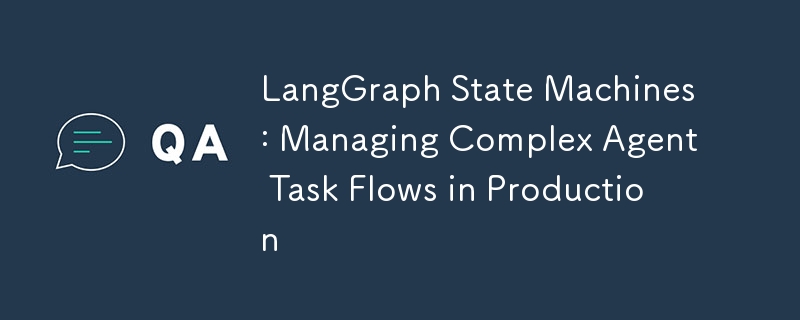Maison >développement back-end >Tutoriel Python >Machines à états LangGraph : gestion des flux de tâches d'agent complexes en production
Machines à états LangGraph : gestion des flux de tâches d'agent complexes en production
- Barbara Streisandoriginal
- 2024-11-24 03:37:091160parcourir

Qu’est-ce que LangGraph ?
LangGraph est un framework d'orchestration de flux de travail conçu spécifiquement pour les applications LLM. Ses principes fondamentaux sont :
- Diviser les tâches complexes en états et transitions
- Gestion de la logique de transition d'état
- Gestion de diverses exceptions lors de l'exécution des tâches
Pensez au shopping : Parcourir → Ajouter au panier → Commander → Paiement. LangGraph nous aide à gérer efficacement ces flux de travail.
Concepts de base
1. États
Les états sont comme des points de contrôle dans l'exécution de vos tâches :
from typing import TypedDict, List
class ShoppingState(TypedDict):
# Current state
current_step: str
# Cart items
cart_items: List[str]
# Total amount
total_amount: float
# User input
user_input: str
class ShoppingGraph(StateGraph):
def __init__(self):
super().__init__()
# Define states
self.add_node("browse", self.browse_products)
self.add_node("add_to_cart", self.add_to_cart)
self.add_node("checkout", self.checkout)
self.add_node("payment", self.payment)
2. Transitions d'État
Les transitions d'état définissent la « feuille de route » de votre flux de tâches :
class ShoppingController:
def define_transitions(self):
# Add transition rules
self.graph.add_edge("browse", "add_to_cart")
self.graph.add_edge("add_to_cart", "browse")
self.graph.add_edge("add_to_cart", "checkout")
self.graph.add_edge("checkout", "payment")
def should_move_to_cart(self, state: ShoppingState) -> bool:
"""Determine if we should transition to cart state"""
return "add to cart" in state["user_input"].lower()
3. Persistance de l'État
Pour garantir la fiabilité du système, nous devons conserver les informations d'état :
class StateManager:
def __init__(self):
self.redis_client = redis.Redis()
def save_state(self, session_id: str, state: dict):
"""Save state to Redis"""
self.redis_client.set(
f"shopping_state:{session_id}",
json.dumps(state),
ex=3600 # 1 hour expiration
)
def load_state(self, session_id: str) -> dict:
"""Load state from Redis"""
state_data = self.redis_client.get(f"shopping_state:{session_id}")
return json.loads(state_data) if state_data else None
4. Mécanisme de récupération des erreurs
Toute étape peut échouer, et nous devons gérer ces situations avec élégance :
class ErrorHandler:
def __init__(self):
self.max_retries = 3
async def with_retry(self, func, state: dict):
"""Function execution with retry mechanism"""
retries = 0
while retries < self.max_retries:
try:
return await func(state)
except Exception as e:
retries += 1
if retries == self.max_retries:
return self.handle_final_error(e, state)
await self.handle_retry(e, state, retries)
def handle_final_error(self, error, state: dict):
"""Handle final error"""
# Save error state
state["error"] = str(error)
# Rollback to last stable state
return self.rollback_to_last_stable_state(state)
Exemple concret : système de service client intelligent
Regardons un exemple pratique : un système de service client intelligent :
from langgraph.graph import StateGraph, State
class CustomerServiceState(TypedDict):
conversation_history: List[str]
current_intent: str
user_info: dict
resolved: bool
class CustomerServiceGraph(StateGraph):
def __init__(self):
super().__init__()
# Initialize states
self.add_node("greeting", self.greet_customer)
self.add_node("understand_intent", self.analyze_intent)
self.add_node("handle_query", self.process_query)
self.add_node("confirm_resolution", self.check_resolution)
async def greet_customer(self, state: State):
"""Greet customer"""
response = await self.llm.generate(
prompt=f"""
Conversation history: {state['conversation_history']}
Task: Generate appropriate greeting
Requirements:
1. Maintain professional friendliness
2. Acknowledge returning customers
3. Ask how to help
"""
)
state['conversation_history'].append(f"Assistant: {response}")
return state
async def analyze_intent(self, state: State):
"""Understand user intent"""
response = await self.llm.generate(
prompt=f"""
Conversation history: {state['conversation_history']}
Task: Analyze user intent
Output format:
{{
"intent": "refund/inquiry/complaint/other",
"confidence": 0.95,
"details": "specific description"
}}
"""
)
state['current_intent'] = json.loads(response)
return state
Usage
# Initialize system
graph = CustomerServiceGraph()
state_manager = StateManager()
error_handler = ErrorHandler()
async def handle_customer_query(user_id: str, message: str):
# Load or create state
state = state_manager.load_state(user_id) or {
"conversation_history": [],
"current_intent": None,
"user_info": {},
"resolved": False
}
# Add user message
state["conversation_history"].append(f"User: {message}")
# Execute state machine flow
try:
result = await graph.run(state)
# Save state
state_manager.save_state(user_id, result)
return result["conversation_history"][-1]
except Exception as e:
return await error_handler.with_retry(
graph.run,
state
)
Meilleures pratiques
-
Principes de conception de l'État
- Gardez les états simples et clairs
- Stocker uniquement les informations nécessaires
- Considérez les exigences de sérialisation
-
Optimisation de la logique de transition
- Utiliser des transitions conditionnelles
- Évitez les boucles infinies
- Définir des limites maximales de pas
-
Stratégie de gestion des erreurs
- Mettre en œuvre une dégradation gracieuse
- Enregistrer les informations détaillées
- Fournir des mécanismes de restauration
-
Optimisation des performances
- Utiliser des opérations asynchrones
- Implémenter la mise en cache de l'état
- Taille de l'état de contrôle
Pièges courants et solutions
-
Explosion d'État
- Problème : Trop d'états rendant la maintenance difficile
- Solution : fusionner les états similaires, utiliser des combinaisons d'états au lieu d'en créer de nouvelles
-
Situations d'impasse
- Problème : transitions d'état circulaires provoquant le blocage des tâches
- Solution : Ajouter des mécanismes de délai d'attente et des conditions de sortie forcée
-
Cohérence de l'État
- Problème : États incohérents dans les environnements distribués
- Solution : utilisez des verrous distribués et des mécanismes de transaction
Résumé
Les machines à états LangGraph fournissent une solution puissante pour gérer les flux de tâches complexes des agents IA :
- Gestion claire du flux de tâches
- Persistance fiable de l'état
- Gestion complète des erreurs
- Extensibilité flexible
Ce qui précède est le contenu détaillé de. pour plus d'informations, suivez d'autres articles connexes sur le site Web de PHP en chinois!

